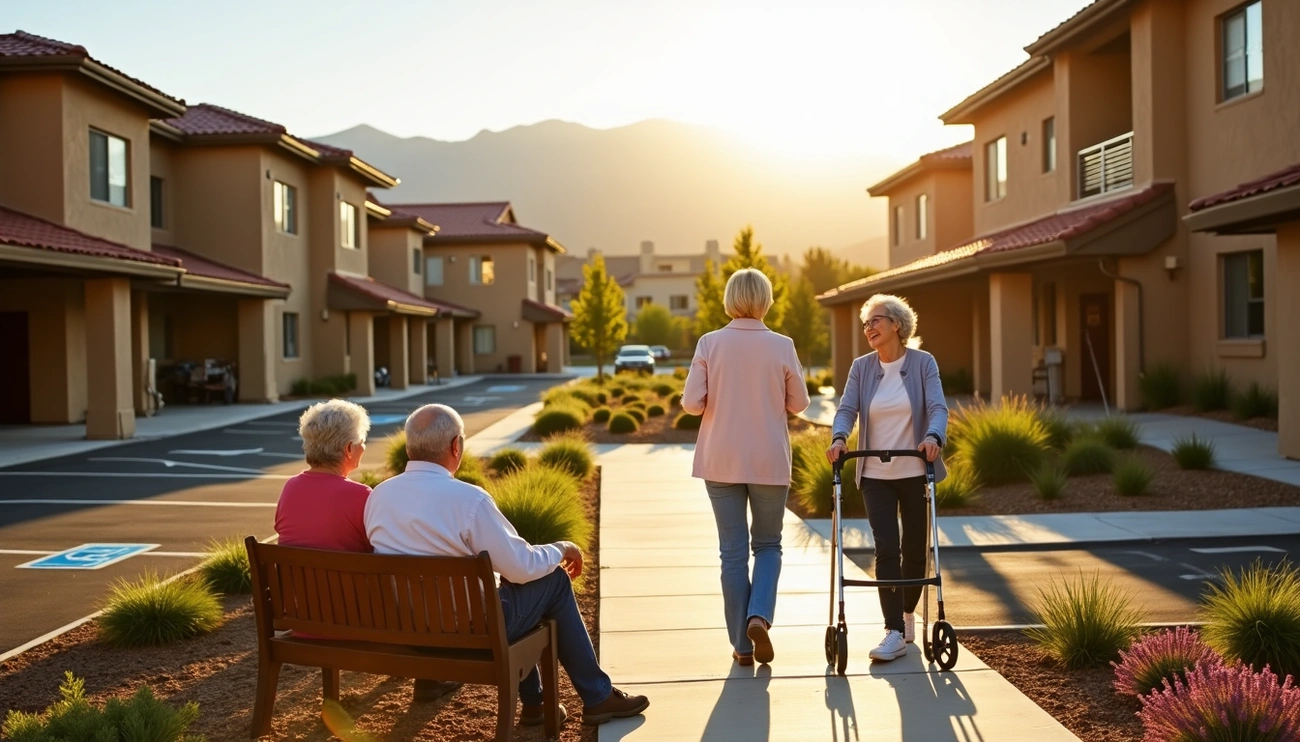Home and Community-Based Services for Senior Adults
Home and community-based services (HCBS) are person-centered care services for senior adults living at home in the community. These services help seniors who need daily assistance with tasks like dressing, bathing, and preparing meals. Seniors also benefit from social activities that keep them connected to the community.
Below is information about the benefits and challenges of home and community-based services. The remainder of this article will explore different types of services and how you can find high-quality services in your area.
Benefits of Home and Community-Based Services
Home and community-based services offer a wide range of benefits. Some of the most notable include:
- They’re less expensive than residential care. Services provided in-home or through community, centers will usually cost less than 24/7 care provided by a senior living facility.
- They offer spiritual and cultural activities. Staying mentally and physically active will improve a senior’s quality of life. Since there are so many services available, you can find some to fit your religious and cultural preferences.
- Seniors get to enjoy the comfort of home. Instead of living in a senior living facility, seniors get to live independently with the support of home and community-based services.
- Family members could become paid caregivers. Certain waivers may allow family members to care for their senior relative while receiving pay that otherwise goes to outside care.
The most significant benefit to home and community-based services is the independence and flexibility they afford seniors. Seniors can live on their own and receive the assistance they need to live life to the fullest.
Challenges of Home and Community-Based Services
Despite all the good things about home and community-based services, there are some drawbacks:
- Some seniors struggle to find available and qualified caregivers. In-home services require available service providers. Some areas may not have enough caregivers to fully meet the needs of seniors living at home.
- Families struggle with caregiver burnout. If a senior depends on a family caregiver daily, this can lead to family burnout. It’s important to consider support systems for caregivers when planning to care for an aging loved one. The daily support tasks will often fall to these family members.
- There isn’t 24/7 medical support in the home. Senior living facilities offer around-the-clock medical support, making them a good option for seniors needing constant medical monitoring. While living at home provides seniors independence, they do not have regular medical monitoring as a safety net.
- There are fewer safeguards in place to protect seniors living at home. Seniors living at home may be especially vulnerable to abuse or financial manipulation by family members. It’s necessary to put safeguards in place to ensure the health and well-being of an aging loved one.
- Financial assistance may take a long time to process. There’s often a long way and application process before a senior’s in-home services can be approved. These costs can add up without the financial backing of the senior’s insurance.
It’s important to weigh these pros and cons when determining whether to hire home and community-based services. If a senior’s needs are too great to be managed by in-home assistance, it may be time to transition to senior care or nursing facility.
Health Services vs. Human Services
Home and community-based services can be either health services or human services. However, there is some amount of overlap between the two. Both kinds of services belong to the category of home and community-based services.
Health services include skilled nursing, therapies (speech, physical, and occupational), pharmacy, case management, personal care, caregiver training, disease prevention, and diet management. For seniors facing terminal medical conditions, hospice care and comfort care are two additional health service options.
Human services include senior centers, adult daycares, congregate meals, home delivery meal plans, personal care (such as dressing and bathing), transportation, home safety assessments, household cleaning, financial services, legal services (like preparing a will), and telephone reassurance. These services meet the necessary, non-medical needs of a senior adult.
How to Find Quality Home and Community-Based Services in Your Area
Finding home and community-based services is a vital part of a senior care plan. Below is a list of different services and some information on finding those services in your area.
Congregate (Group) Meals
These weekday lunches are served to older adults in a group setting, often a local senior center. If you want to find information about congregate meals in your area, the Area Agency on Aging can give you information about options in your area.
Home-Delivered Meals
Individuals who qualify for these programs can have nutritious meals delivered directly to their homes. Meals on Wheels is a network of about five thousand programs serving local communities. Contact Meals on Wheels or your local senior center to find out about options in your area.
Nutrition and Wellness Education
Skilled educators provide information about wellness and fitness to aging adults in senior-oriented classes. These classes provide answers to nutrition-related questions. They also help seniors manage health issues through dietary changes.
If you’re looking for local nutrition and wellness education, check out your local senior center. You may also ask your family doctor about diet and nutrition resources in your area.
Physical Fitness Classes
These classes promote health, mobility, and flexibility to senior adults. The specialized workouts target senior-specific needs. Contact your local senior center for a senior fitness class schedule. Your local YMCA and gyms may also provide courses designed for senior adults.
Senior Recreation
Senior recreation refers to any activity that cares for the socialization and enrichment of aging adults. Recreational activities may include games, crafts, travel, gardening, and other activities. Check with your local senior centers, YMCA, and religious institutions to find activities to keep seniors engaged with others in the community.
Emergency Response Services
Seniors living at home may need in-home electronic support to ensure their safety. Medical monitoring devices allow senior adults to access 24/7 medical help in case of a fall or medical emergency. Medical Guardian and MobileHelp both provide excellent services for medical monitoring.
These tools allow seniors to maintain independence without sacrificing their physical safety.
Home Modification & Repair
If a senior plans to continue living at home, their house may require some modifications and repairs. Some modifications involve adding supports to increase accessibility and reduce the risk of injury. Assistive devices like a life or walk-in tub allow a senior to care for their daily needs.
Friendly Visiting
When a senior enrolls in home and community-based services, they can get visits to reduce their isolation. Seniors need to have regular contact with the outside world, since this provides them with emotional and psychological support.
This may include telephone reassurance, where seniors are contacted regularly by phone to reduce isolation and ensure ongoing safety.
Homemaker Services
Seniors often need help with meal preparation, money management, shopping, and light housework. Homemaker services provide these supports to senior adults. When looking for in-home homemaker services, make sure you properly research the services and providers to safeguard your aging loved one and their home.
Chore Services
Household maintenance like heavier housework, yard work, and sidewalk maintenance can be an extreme hardship for senior adults. These things need to be taken care of, so it’s essential to have someone help with chore services.
If you’re looking for yard work assistance like mowing and raking, you may be able to connect with local volunteers (often youth fulfilling community service requirements). While this won’t cover all your needs, it can be a great way to connect with the community while getting lawn care.
Paid chore services are often the best way to ensure that things will be done correctly and on time. When a senior can’t care for these things themselves, it’s crucial to find suitable support.
Personal Care Assistance
Home services also include personal care assistance. Some senior adults require help with bathing, dressing, and other daily living activities. Reach out to the local Area Agency on Aging or social services agency to find a qualified in-home caregiver for personal care assistance.
Adult Day Services
Adult day services provide daytime personal care and meals in a supervised group setting. They often provide social and recreational activities, training, and counseling for senior adults.
The best way to find these services in your area is by searching the National Adult Day Services Association website. The Eldercare Locator is a phone resource for finding adult day services. You can reach them by calling 1-800-677-1116.
Respite Care
Full-time family caregivers need a break to prevent burnout. Respite care services provide full-time family caregivers an opportunity to recharge. Skilled professionals provide this care in-home or on a short-term basis in an institutional setting.
Reach out to your Area Agency of Aging or local senior center to learn about respite care resources in your area. You can also reach out to the ARCH National Respite Network at archrespite.com/respitelocator.
Conclusion
Living at home doesn’t mean a senior has to do everything themselves. There are plenty of home and community-based resources available to help aging adults continue living at home. This allows seniors the independence they want without sacrificing their safety and well-being.
These services provide seniors and their families with physical, mental, and spiritual care. Home and community-based services play an essential role in providing for senior adults across the country.




